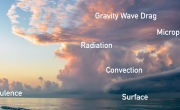Spring 2023 | As the Common Community Physics Package (CCPP) heads toward operational status within NOAA’s numerical weather prediction (NWP) advancement efforts, the community that helped make it a reality will gather virtually alongside the “CCPP-curious” for the CCPP Visioning Workshop on August 15-17 to discuss plans for its continued improvement over the next 5-10 years. A strong emphasis for the workshop will be placed on accommodating the software coupling needs of the next generation of… Read More
Did you know?: METplus Advanced Training Series Focuses on High Impact Events and Subseasonal to Seasonal Prediction
Spring 2023 | The METplus team offered three sessions of an advanced training series during Spring 2023 and plans to add three to four new sessions during Fall 2023. The intent was to extend beyond the Basic Training Series provided during the winter and spring of 2021/2022. The recorded Basic series and report about the sessions can be found at METplus Training Series… Read More
PROUD Award - Excellence in Action: John Opatz, Associate Scientist III, RAL/NCAR
Performance Recognition for OUtstanding DTC achievements (PROUD) Award
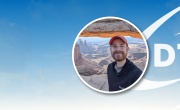
2023-05-17 | John Opatz is an Associate Scientist III in RAL at NCAR contributing his expertise to two DTC projects: the Enhanced Model Evaluation Tools (METplus) and METplus training. John is highly skilled and the go-to scientist for reviewing Pull Requests across METplus repositories. He made 210 METplus GitHub contributions in 2022, defining new issues, committing code changes, updating documentation, and reviewing the work of others. John’s Pull Request reviews are detailed, thoughtful, and comprehensive. He often expands his… Read More
Announcement: DTC - EPIC Hierarchical System Development Survey Now - Deadline Extended
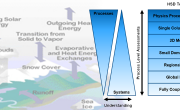
2023-04-11 | All, Developmental Testbed Center (DTC) is working with the Earth Prediction Innovation Center (EPIC) to establish community requirements for a Hierarchical System Development (HSD) . This effort is focused on accelerating the rate of improving numerical prediction across scales using the Unified Forecast System (UFS). The requirements will be captured in a white paper. We would like to invite you to provide your input via this survey. The goal of the survey is to identify: What gaps you feel exist in the UFS HSD… Read More
Announcement: METplus Advanced Training Series

2023-03-10 | The METplus team is pleased to announce that registration for the METplus Advanced Training Series is now open. The training will be 2-hour sessions and will be held virtually in April-May and August-October from 11am-1pm ET / 9am-11am MT / 1600-1800 UTC. The first 3 sessions include: April 19th - Using METplus in the cloud to evaluate UFS protoypes May 3rd - Using METplus to compute S2S diagnostics May 17th - Using METplus to evaluate coupled model components Sessions will be recorded to provide those who cannot… Read More
Lead Story: Using the CCPP SCM as a Teaching Tool
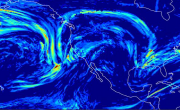
Winter 2023 | The climate graduate programs at George Mason University offer an Earth System Modeling course. The course is divided into two subtopics, theory and practicum. The theoretical session offers lectures introducing students to the physical and dynamical components of an Earth system model, their interactions, and how these components are used to predict the behavior of weather and climate. When I became the instructor of the Earth System Modeling course, I added a module to the practicum session that provides students the… Read More
Director's Corner: Hui-Ya Chuang

Winter 2023 | I was excited when the DTC nominated me to serve on the DTC Science Advisory Board in 2020 and then felt very honored to be asked to become a co-chair in 2022. As one of the first group of EMC staff to be sent to work with DTC on bridging the gap between research and operations, I have watched DTC grow into an organization that accomplished its mission to bridge the gaps, by not only providing community support for several operational softwares, but also facilitating collaboration by developing Common Community Physics… Read More
Who's Who: Mike Kavulich
Winter 2023 | Mike Kavulich grew up in suburban Connecticut, the oldest of three children with a younger brother and sister. From his earliest memories he had an obsession with the weather, giving weather reports to his class in preschool, watching and re-watching weather documentaries recorded from TV on VHS, and tracking hurricanes on a copied paper hurricane tracking map taped to the wooden basement door. Because he did not have cable or internet, he would call his grandmother every day of the late summer to turn on the Weather… Read More
Bridges to Operations: Informing NCEP Legacy Operational Model Retirement Through Scorecards
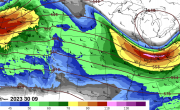
Winter 2023 | NOAA is undergoing a massive, community-driven initiative to unify the NCEP operational model suite under the Unified Forecast System (UFS) umbrella. A key component of this effort is transitioning from the legacy systems to unified Finite-Volume Cubed-Sphere (FV3)-based deterministic and ensemble operational global and regional systems. For the UFS, the goal is to consolidate operational models around a common software framework, reduce the complexity of the NCEP operational suite, and maximize available HPC resources,… Read More
Visitors: How do TC-specific Planetary Boundary Layer (PBL) physics impact forecasts across scales and UFS applications?
Visitor: Andrew Hazelton
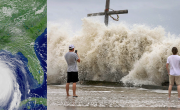
Winter 2023 | One of the most important aspects of numerical modeling is the series of approximations made to represent certain physical processes, known as “parameterizations.” These approximations of critical atmospheric phenomena can make a huge impact on the solutions that a model provides, so making these parameterizations more accurate across a variety of applications is a major goal of numerical weather prediction (NWP). … Read More
Community Connections: JEDI projects adopts and contributes to CCPP variable naming standard

Winter 2023 | In September of 2022, the JCSDA (Joint Center for Satellite Data Assimilation) officially adopted the CCPP standard names, originally developed for use with the Common Community Physics Package, as the model variable names to be used within the JEDI (Joint Effort for Data assimilation Integration) software. The JEDI software is employed by many Earth observing systems and requires agreed-upon names to be used for the quantities being input and computed. It is critical that these names are understood identically between… Read More
PROUD Award - Excellence in Action: Gerard Ketefian, Research Scientist III CU/CIRES and NOAA GSL
Performance Recognition for OUtstanding DTC achievements (PROUD) Award

2023-02-23 | Gerard Ketefian works for CU/CIRES at NOAA GSL and contributes to four DTC projects: Unified Forecast System (UFS) Short-Range Weather Application (SRW) software support & community engagement, DTC activities in support of community involvement with the UFS, Agile Rapid Refresh Forecast System (RRFS) prototype Testing and Evaluation (T&E), and Optimizing Ensemble Design for Use in the RRFS. Gerard has taken the lead in the submission of a massive METplus-related contribution to the UFS SRW Application repository… Read More
Software Release: METplus v5.0 Coordinated Release

2022-12-09 | The DTC is pleased to announce the release of the multi-component verification framework called the enhanced Model Evaluation Tools (MET), or METplus (https://doi.org/10.5281/zenodo.5567804). METplus contains a suite of Python… Read More
Lead Story: SIMA: Constructing a Single Atmospheric Modeling System for Addressing Frontier Science Topics
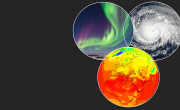
Autumn 2022 | The System for Integrated Modeling of the Atmosphere (SIMA) project aims to unify existing NCAR community atmosphere modeling efforts across weather, climate, chemistry, and geospace research. NCAR scientists, in partnership with the atmospheric and geospace sciences research community, are developing a SIMA framework and infrastructure that enables simulations of atmospheric processes and atmospheric interactions with other components of the coupled Earth system ranging from the… Read More
Pagination
Copyright © 2024. All rights reserved.
